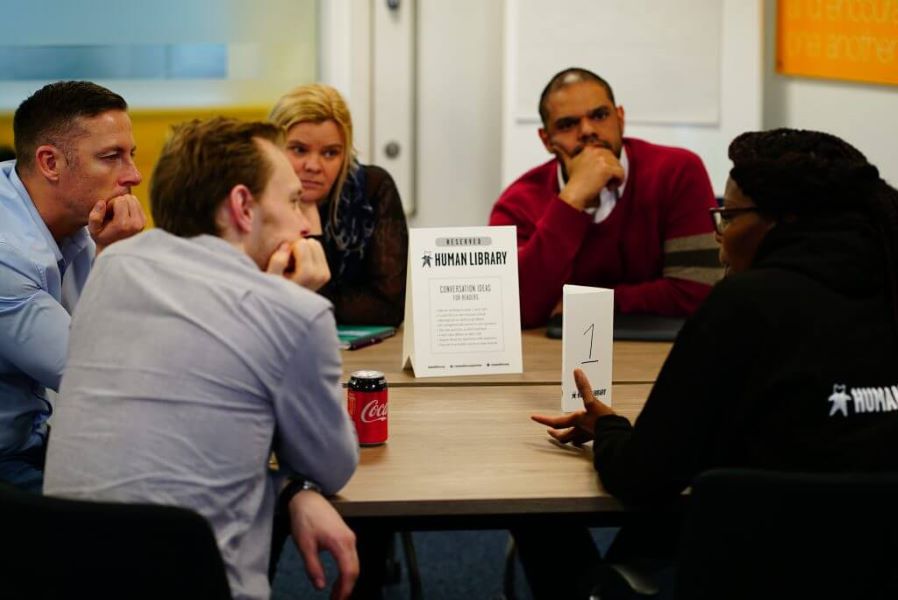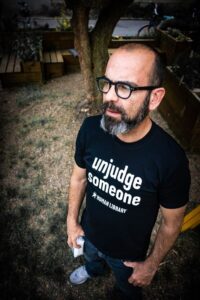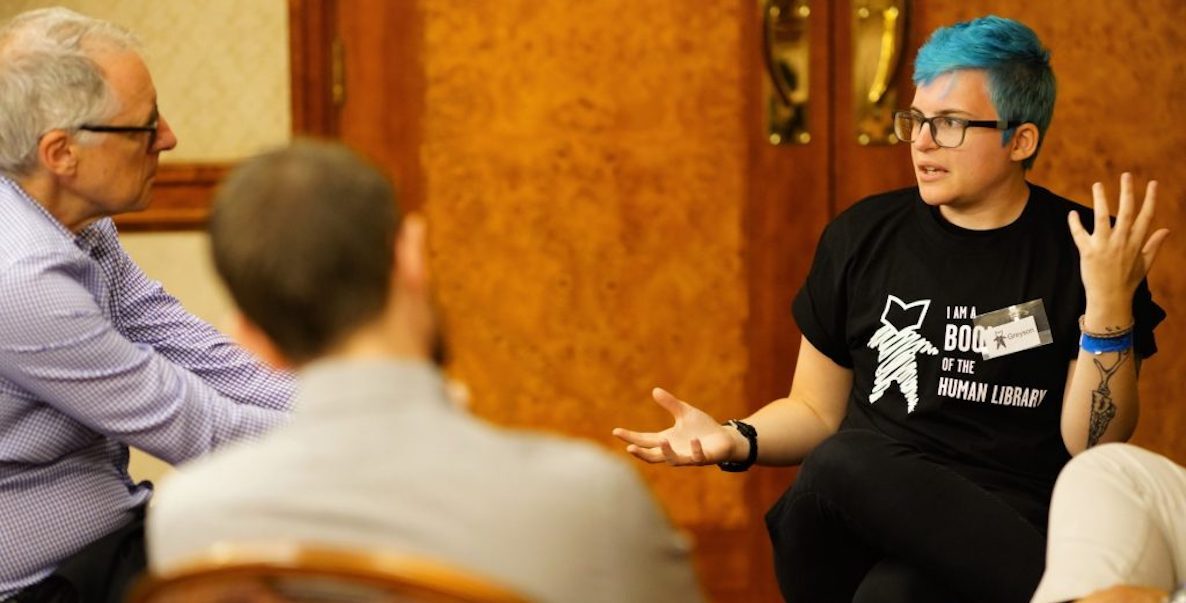“Don’t judge a book by its cover” is the kind of advice most people forget when they meet Joel Hartgrove. Maori tattoos cover his neck, ears and his shaved skull, and written across his forehead are the Joker-esque letters HAHAHA. “A lot of people actively avoid me,” the indigenous Australian says. “Families with children will grab their kids and push them away from me.”
Until a few years ago, he was a proud, un-tattooed soldier, but after an injury left him with chronic pain and depression, he began getting tattoos “as a mechanism to deter people from me.” Now he is training to become a first responder, and the tattoos impact his life “greatly on a daily basis.” He wants to laser them away so he doesn’t scare his patients.
Hartgrove is an open book. You can borrow him for 20 minutes, talk to him about his time in the Australian army, his indigenous roots, his tattoos, anything you’d like. You’ll find you’re speaking with a deep thinker who answers nosy questions with humor and heart—a common trait among the “books” available for loan in Ronni Abergel’s library. “They are stigmatized,” Abergel says of his collection, “maybe because of their weight, their looks, their profession, their religious, sexual or political orientation, or because they survived abuse and traumas. We can’t just judge someone on face value.”
Abergel, 48, is the director of the biggest and most beautiful library in the world: the Human Library, where you borrow people instead of books and speak with them about their lives.
His library rules are simple: Treat the books respectfully; bring them back on time and in the same shape you borrowed them; don’t take them home.
The Danish journalist and activist started the Human Library 21 years ago when the Danish Roskilde music festival asked him to organize interactive encounters with strangers. “What if we invited some of the most unpopular people to tell us their story so we could understand them better and give them a chance to move out of the box we put them in?” he asked his friends in Copenhagen.
“Like a library?“ one of his friends replied. It was an epiphany for Abergel. “A library is one of the few institutions in our culture that really embraces, or at least accommodates, everyone and treats everyone as equal,” he says. “You can be old or young, able or disabled, blind or deaf, you can be whatever you want to be.”
His library rules are simple: Treat the books respectfully; bring them back on time and in the same shape you borrowed them; don’t take them home. “They will answer any question you have the courage to ask,” Abergel promises.
The Human Library is now active in 80 countries, with branches in Texas and Tokyo, Bangladesh and Berlin. Every reader who visits, virtually or in-person, chooses two or three topics that interest them: rugby, depression, refugees, sex work, cancer, grief. The choices are nearly endless. “There is a great book hidden in all of us, and most of us would be bestsellers,” Abergel believes. “Take the bodybuilder, the Roma, the Muslim, the Jew, the hippie, the street artist… Everybody has a unique story.”
Browsing the collection
To be honest, I was skeptical. As a reporter, I speak with fascinating people almost every day. But right away, my first human book was a page-turner: Alma Faham, a warm, witty architect and abstract artist who lives in Connecticut. Born in Kuwait to a Syrian father and a Jordanian mother, Faham moved to Syria during the first Gulf War, then to Greece. It was hard to choose which aspect of her life was the most fascinating: her expressive art, her religion, her world travels. She answered all of my questions without hesitation, including about her personal reasons for participating in the library.

“The problem was always the pre-judgment,” she shares. “Once you say you’re from the Middle East, people put you in a certain category. The sad part is that I am considered a foreigner in my own hometown because I have lived elsewhere for so long.”
My second book, a gay Canadian who identifies as being on the spectrum and has a rare blood disorder, was also heartbreakingly open. This is what makes these encounters unique: they’re not interviews, but intimate, honest, private conversations. The books invite you with an unusual openness: “Ask me anything!”
RELATED: Who is telling the unknown stories of Black life in Philly?
Before the library, a 19-year-old Abergel, his brother and two friends had initiated “Stop the Violence” in 1993, after a friend was stabbed at a nightclub in Copenhagen. The idea was to train youths to resolve conflicts peacefully. “After one is stabbed to death, the others become fearful and will also take a knife with them the next time they go out,” he says.
Federal funding for Stop the Violence had ended by 2000. When the organizers of Roskilde, the largest music festival in Northern Europe, invited them to organize an interactive element, the budget was next to nothing. Abergel was worried nobody would show up to the Human Library. “Who wants to speak with a policeman or a Muslim or a transgender person?” he thought. Turns out, if the framework feels right, many do.
The very first book at Roskilde, a police officer named Erik, was immediately surrounded by three anti-fascists who had had bad experiences with the police at protests. They wanted to know why he had become a cop. Erik was delighted he finally had a chance to explain his perspective. “After an hour—because at the beginning, the readings lasted two hours—an Antifa friend arrived, drunk and full of rage, to insult and verbally attack the policeman,” Abergel remembers. “And do you know who protected the cop? Before Erik could even react, the three protesters came to his aid and told their friend: ‘You don’t know this man, but we do.’ After an hour!” That was when Abergel knew: It worked.
The librarian

Abergel himself is now a book. After his 37-year-old wife died unexpectedly, leaving him with two small children, “That was my Ground Zero,” he says. “The stigma was enormous. People didn’t know what to say to me, so they said nothing. It was horrible. I felt like it was my responsibility to make them feel comfortable, but I was in shambles myself.”
Like any good librarian, Abergel takes measures to ensure his books are treated well. All human books are trained to answer challenging questions, set boundaries and retreat if they become overwhelmed. Trained “librarians,” which includes 25 full-time staff and countless volunteers around the globe, speak with readers and books before a “reading” to take the temperature. A trained psychologist is on call even after hours, so a book can call anytime if a reading got under their skin.
“My vision is that one day we don’t need the library anymore because we have the courage again to talk to the people around us. But in our daily grind, we don’t have the time and opportunity.”
Often, a topic attracts readers who have a very personal interest — for instance, a mother whose daughter was diagnosed with anorexia and who now wants to ask a book with an eating disorder all the questions she does not dare ask her teenager.
Abergel only excludes people who are aggressive, who have an agenda, or who mistake the library for psychotherapy. “If you’re on a vengeance mission and spend all the time finger-pointing and blaming others, there are 844 other platforms out there for you, but not ours.”
This sets the tone for respectful encounters and honest exchanges about our experiences. “We don’t talk to each other anymore,” Abergel says. “My vision is that one day we don’t need the library anymore because we have the courage again to talk to the people around us. But in our daily grind, we don’t have the time and opportunity.”
Abergel recalls the shock when all in-person events abruptly had to shut down in March 2020 and the library suddenly had to go virtual. But there was a silver lining: readership doubled, and geographic proximity became irrelevant—the plumber from Kenya is now friends with the artist from Bangladesh. Some local Human Libraries continued in person, such as in Copenhagen, where books and readers were able to meet outside in a park, with masks and space between them. And now, as the world reopens, the Human Libraries offer a safe, approachable framework for many who are finding their way back to in-person social interaction.
“I feel the same way,” Abergel admits. Despite being a born communicator who astonishes his 10-year-old son with his ability “to talk to everyone everywhere,” he found that he recently had to step out of a crowded birthday party to gather himself.
All Human Library readings are free, and while hosts often pay for travel to their school or facility, the books are unpaid volunteers and the project receives no federal funding. Abergel recently started financing it by organizing readings for companies like Microsoft or Amazon. Even there, Abergel says, his mission is to bust prejudice—as his T-shirt says, Unjudge someone—and perhaps even link up his books with the corporate job market, “for people with disabilities or depression, for hippies and dreamers.”
When asked which book he remembers best, Abergel recalls an incest survivor. One of her readers was a pedophile. “I understand if you don’t want to speak with me,” the man started out, “but I want to understand how I can mitigate the suffering I have caused my own child.”
The book decided to continue the reading, spoke openly about the grave physical and emotional consequences of her abuse, and helped the reader to better understand a survivor’s perspective. He had a very specific reason to visit the Human Library: “I am here because I have no one else I can ask for advice.”
This story originally appeared in Reasons to Be Cheerful.
![]()
RELATED
Photo courtesy of Human Library




